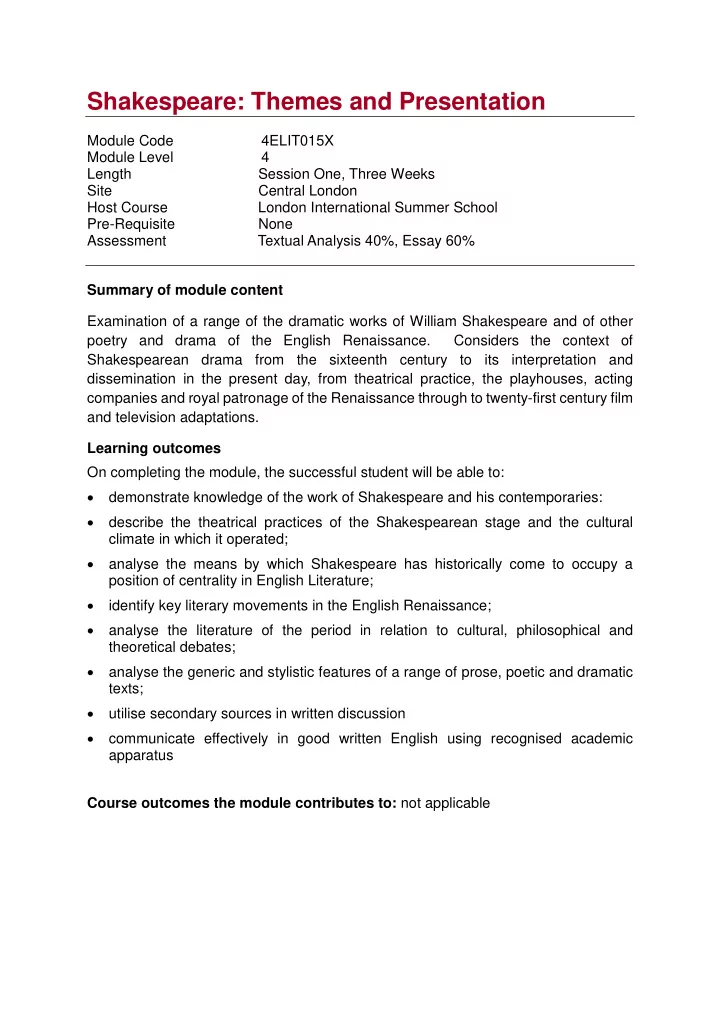

Shakespeare: Themes and Presentation Module Code 4ELIT015X Module Level 4 Length Session One, Three Weeks Site Central London Host Course London International Summer School Pre-Requisite None Assessment Textual Analysis 40%, Essay 60% Summary of module content Examination of a range of the dramatic works of William Shakespeare and of other poetry and drama of the English Renaissance. Considers the context of Shakespearean drama from the sixteenth century to its interpretation and dissemination in the present day, from theatrical practice, the playhouses, acting companies and royal patronage of the Renaissance through to twenty-first century film and television adaptations. Learning outcomes On completing the module, the successful student will be able to: • demonstrate knowledge of the work of Shakespeare and his contemporaries: • describe the theatrical practices of the Shakespearean stage and the cultural climate in which it operated; • analyse the means by which Shakespeare has historically come to occupy a position of centrality in English Literature; • identify key literary movements in the English Renaissance; • analyse the literature of the period in relation to cultural, philosophical and theoretical debates; • analyse the generic and stylistic features of a range of prose, poetic and dramatic texts; • utilise secondary sources in written discussion • communicate effectively in good written English using recognised academic apparatus Course outcomes the module contributes to: not applicable
Indicative syllabus content Week one Writing and Performing in Renaissance England The playhouses, the companies, censorship and patronage Humanism, history, law and religious conflict – the History plays. Week two Genre (tragedy) from Elizabethan to Jacobean periods. Sources, Themes and Issues in Shakespearean and Renaissance drama. Theatrical Interpretations, snapshots from1590 – the present. Introduction to the Sonnets and textual analysis exercise (1500 words) Week three Power, race, colonization and gender, Genre (comedy, late romance and city comedy). Shakespeare as Cultural Icon: Interpretations of Shakespeare, 1940 - the present. Teaching and learning methods The module is delivered via lectures and seminars, which will include a range of activities such as tutor and student presentations, supervised small group work and whole group discussion. There will also be the opportunity to develop skills in close textual analysis. In addition, there will be supervised study visits to The Globe Theatre and relevant sites such as the Museum of London for background information on the English renaissance period. Students are encouraged to independently visit a production at the Open Air Theatre (Regent’s Park). Activity type Category Student learning and teaching hours* Lecture Scheduled 12 Seminar Scheduled 24 Tutorial Scheduled Project supervisor Scheduled Demonstration Scheduled Practical Classes and workshops Scheduled Supervised time in studio/workshop Scheduled Fieldwork Scheduled External visits Scheduled 12
Work based learning Scheduled Total Scheduled 48 Placement Placement Independent study Independent 152 Total student learning and teaching hours 200 * the hours per activity type are indicative and subject to change. Assessment rationale The module is assessed via coursework consisting of a textual analysis exercise and an essay. Both elements of assessment will allow students to demonstrate key skills of literacy and effective communication. Assessment criteria In the textual analysis exercise students are expected to demonstrate that they can: • identify the passage of text under consideration • locate the passage within the whole text • select, comment upon and explain the most significant points in the passage • identify particular literary and rhetorical features such as, for example, metaphor, metre or argument • communicate in good written English In the essay students are expected to demonstrate that they can: • understand the question set • select, utilise and synthesise appropriate material (including secondary sources) • show a knowledge and critical understanding of Shakespeare’s work in the context of the period and the work of his contemporaries • produce a structured essay containing a clear argument that answers the set question • communicate in good written English • use appropriate scholarly apparatus, including referencing and bibliography. Assessment methods and weightings Assessment type (e.g. essay, presentation, Weighting Qualifying Qualifying open exam or closed Assessment name % mark % set exam) Textual Analysis 40 35 Analysis (1,500 words) Essay 60 35 Essay (2,500 words)
Sources Essential reading list There are many editions of these plays and poems available, you may use any of them. William Shakespeare King John The Tempest Twelfth Night The Sonnets Christopher Marlowe Edward II John Webster The Duchess of Malfi Thomas Middelton & Thomas Dekker The Roaring Girl
Recommend
More recommend